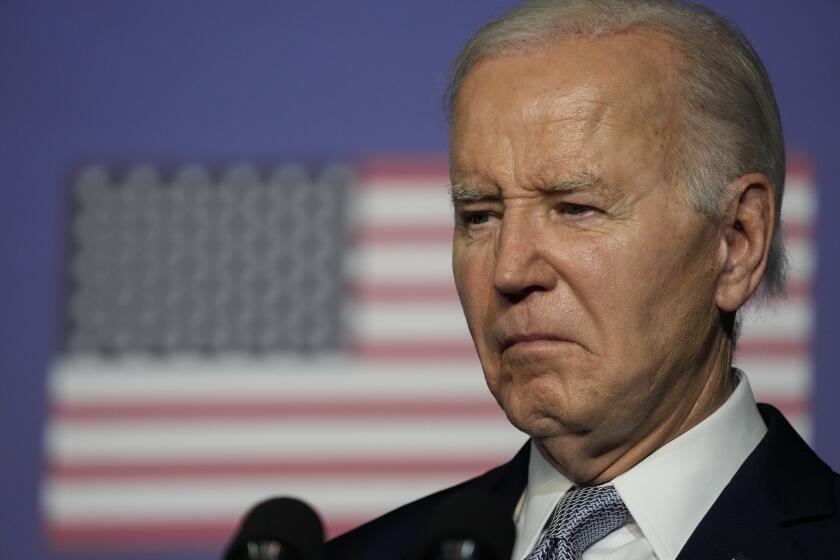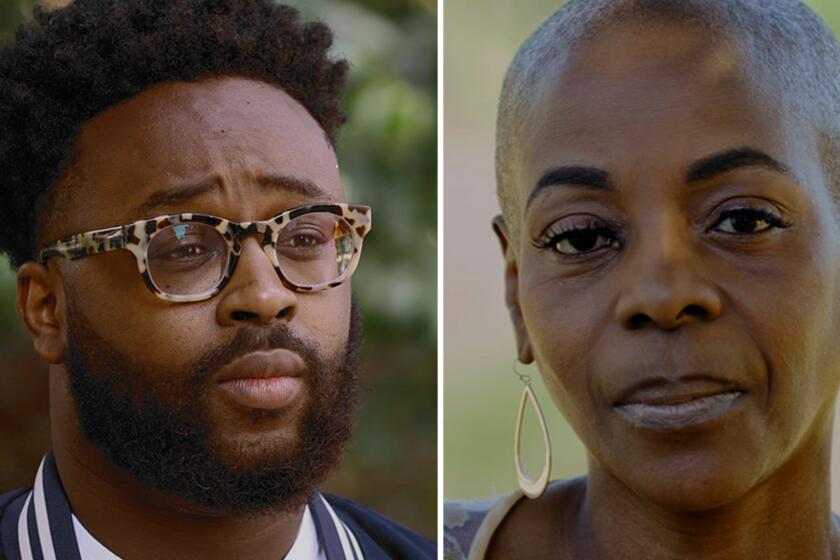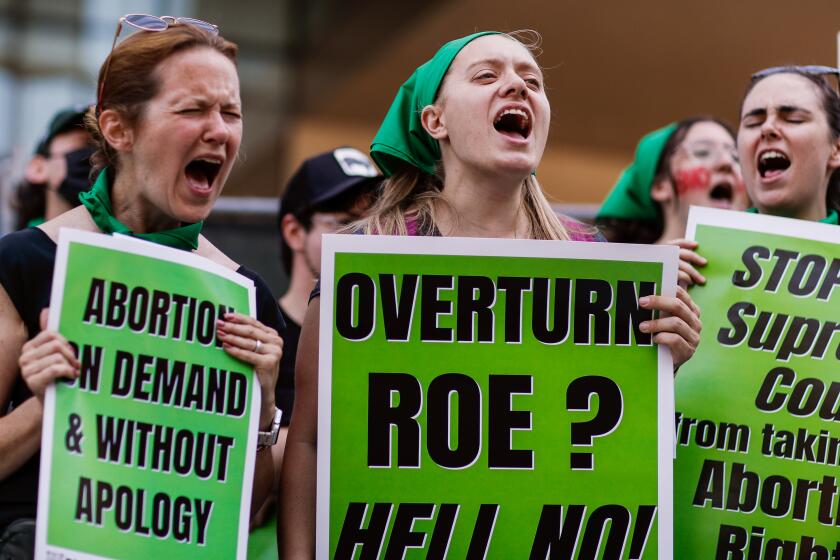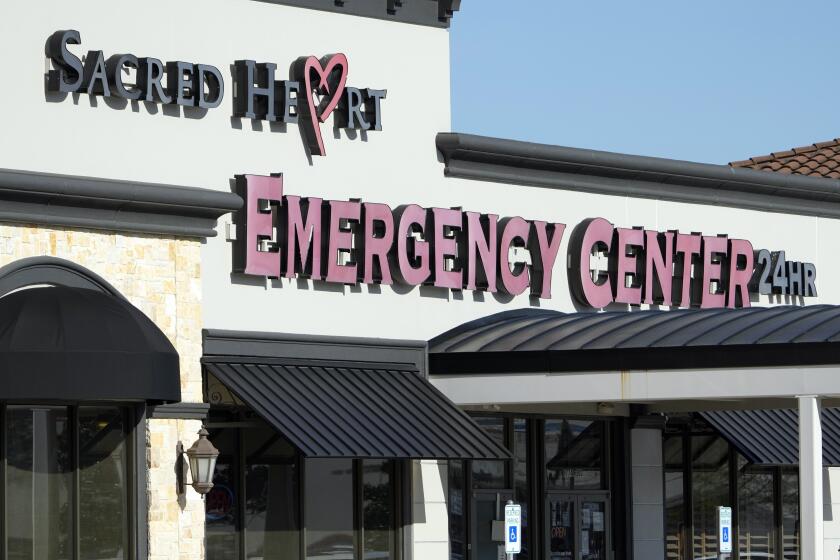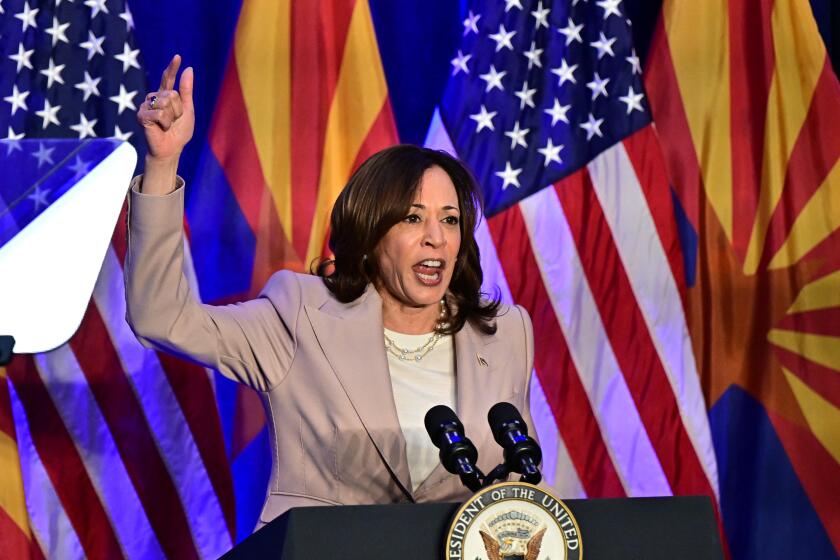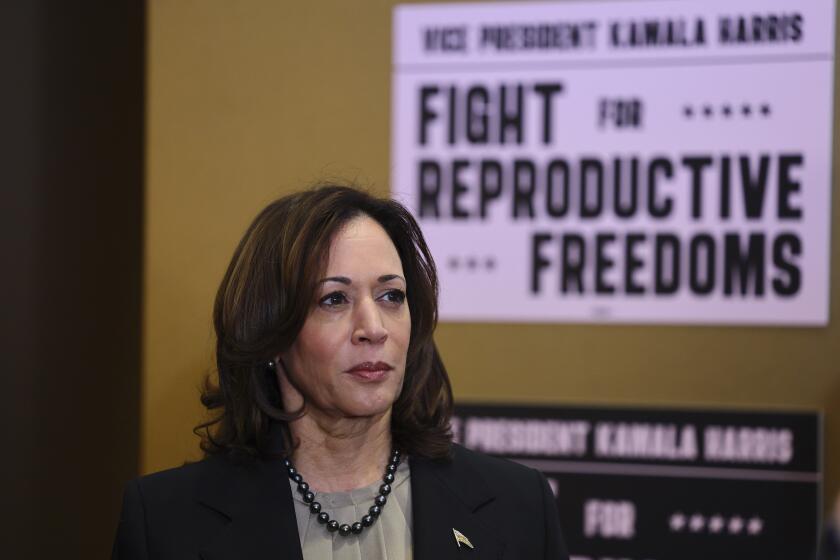Pastors see a wariness among Black men to talk abortion politics as Biden works to shore up base
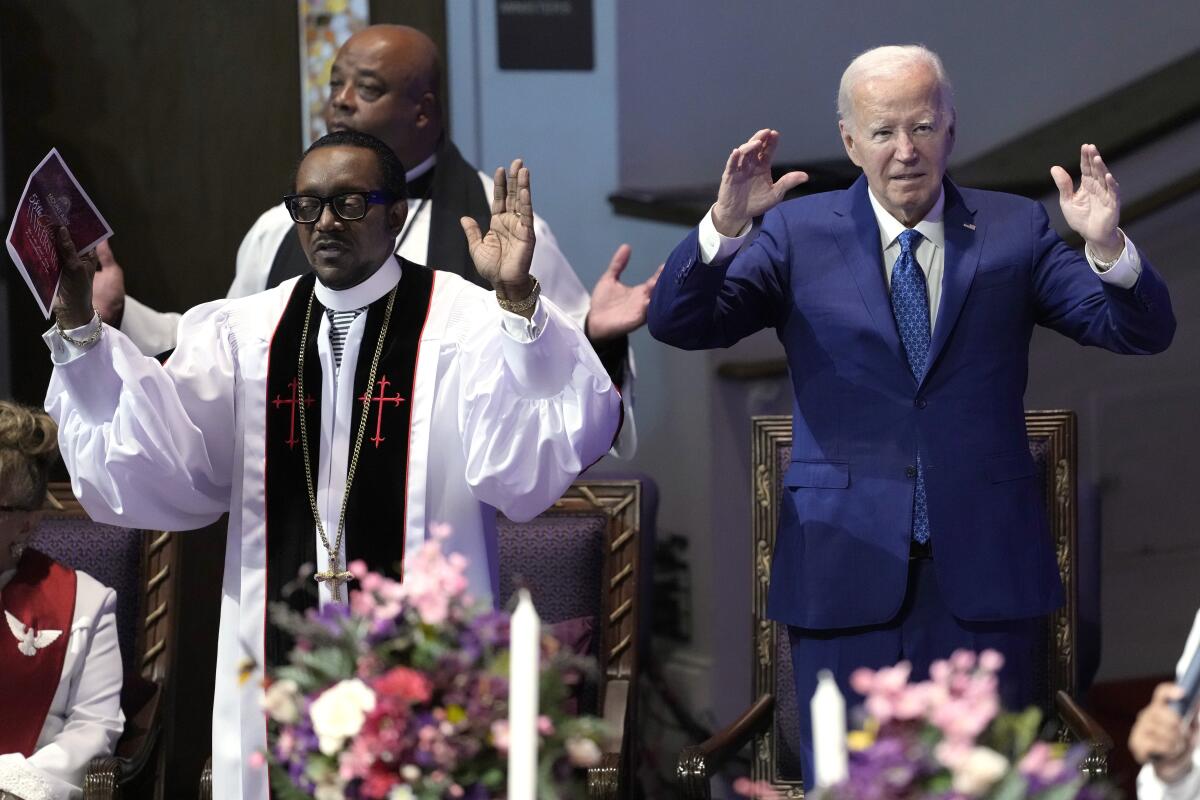
- Share via
WASHINGTON — Phoenix pastor the Rev. Warren H. Stewart Sr. has had countless discussions this election season with fellow Black men on the economy, criminal justice, immigration and other issues dominating the political landscape in their battleground state of Arizona. But never abortion.
“They’re about justice. They’re about Donald Trump potentially reversing all of the gains achieved by the Civil Rights movement. They are not about abortion,” said Stewart.
It’s in stark contrast to what’s being said on the campaign trail, where President Biden and Vice President Kamala Harris are wooing voters who support abortion rights, while Trump and his surrogates pursue anti-abortion voters.
Although Black men traditionally back Democrats, one prevailing narrative is they are unenthusiastic about Biden, the presumptive party nominee. They make up close to 7% of the electorate, according to a Pew Research Center analysis, and this year, a few thousand votes in Arizona, Pennsylvania and other swing states could decide the race.
Democratic U.S. Rep. James Clyburn of South Carolina remains concerned that Trumps’ hypermasculine campaign style is drawing those Black male voters who don’t feel represented in mainstream politics away from the Democratic Party. Clyburn is trying to counter that trend.
Trump won in 2016 by appealing to conservative white Americans. This time, his advantage comes from Black and Latino voters.
After his dismal debate performance inflamed concerns about his age, Biden, 81, also is trying to shore up his loyal base. He recently appeared at Mount Airy Church of God in Christ in Philadelphia and elsewhere in the state to quell lingering questions and rumors.
“I, honest to God, have never been more optimistic about America’s future if we stick together,” said Biden, addressing the congregation in a short speech that evoked Harris but did not mention abortion rights.
Among Black clergy, few are better positioned to assess Biden’s character and fitness than Bishop Reginald T. Jackson.
The 132nd Bishop of the African Methodist Episcopal Church, Jackson, 70, was an advance man on Biden’s first campaign for U.S Senate in 1972, first getting an up-close view of the candidate’s shortcomings as a student at Delaware State University.
“All this stuttering? That ain’t nothing new,” Jackson said from his home in Atlanta.
Black Americans have reasons to feel pride, joy and hope over the election of Biden and Harris as the next president and vice president — but also reasons to feel wary.
Jackson said Biden’s recent flubs during the debate and subsequent news conferences shouldn’t stop him from touting his record of support for historically Black colleges and his administration’s advocacy for minority-owned small businesses.
“It’s almost as if the items the president has accomplished are being held like some sort of state secret,” Jackson said.
On abortion, Jackson believes the federal government shouldn’t meddle in a decision best left to a woman and her doctor, and says he is satisfied with the Biden campaign’s handling of the issue.
Over the last half-century, abortion has remained a fractious issue across Black Protestant churches, fraught with questions about sexuality and gender that their Christian community has struggled with historically.
In interviews, Black church leaders acknowledged that the church has not always been adept at talking about human sexuality, a characteristic they share with their mainstream Protestant counterparts. In “Moral Combat: How Sex Divided American Christians and Fractured American Politics, author R. Marie Griffith, a humanities professor at Washington University in St. Louis, argues that the wariness to discuss sex — and contend with their deep-seated views on female sexuality specifically — is at the heart of many of the most divisive political issues.
Trump and Biden went after each other’s stance on abortion at Thursday night’s debate. But where does each candidate stand?
One Black male pastor in particular, Democratic U.S. Sen. Raphael Warnock of Georgia, senior pastor of Atlanta’s Ebenezer Baptist Church, has been outspoken about his support for abortion access, especially during his 2022 reelection campaign.
But Warren Stewart, who leads First Institutional Baptist Church in Phoenix, wishes Biden and Harris weren’t talking about abortion so much, even as he acknowledged the Supreme Court’s decision to overturn Roe as a “political gift.” He believes abortion should be legal only in cases where the life of the individual giving birth is in danger.
Others disagree. The Rev. Leslie D. Callahan, the first woman to pastor Philadelphia’s historic St. Paul’s Baptist Church, said all men regardless of race need to decide what functions of their bodies they’d like controlled by the federal government. Black women have the highest maternal mortality rate in the U.S., according to the CDC’s 2022 report.
“Without bodily autonomy, what freedom do you really have?” she said.
She pointed out that Biden, who supports protecting access to abortion, isn’t being called to resign from the presidency — just the campaign.
The Biden administration is telling emergency room doctors they must perform emergency abortions when necessary to save a pregnant woman’s health.
“If he’s fit to govern, I don’t quite understand why he’s not fit to run,” Callahan said. “If you’re going to scrutinize Biden, let’s scrutinize his presidency and his policies. If you’re going to scrutinize fitness, then there needs to be consistent and equal scrutiny around the fitness of his opponent.”
As Trump tries to court Black voters, about 7 in 10 Black adults continue to have broadly negative views of him, according to an AP analysis of two consecutive polls conducted in June by the AP-NORC Center for Public Affairs Research. However, that number is down 20 percentage points since early 2021.
Although the Trump campaign has said Black men may be more receptive to his message, Black men and women have similar views of him.
Black men’s opinion of Biden also isn’t overwhelmingly positive. The poll analysis found that about half of Black men have a somewhat or very favorable view of Biden — compared to about 7 in 10 Black women — and about 4 in 10 Black men see the president negatively.
The Rev. Otis Moss Jr., pastor emeritus of the Olivet Institutional Baptist Church in Cleveland, one of the largest and best-known Black churches in Ohio, is disturbed by Trump’s positions, saying the former president cares about preserving life before birth — but not after.
Vice President Kamala Harris said former President Trump is squarely to blame for a recent Arizona court ruling that bans nearly all abortions in the swing state.
“The human rights of the woman, the female, should not be infringed upon by someone else’s political ideology,” Moss said.
Vice President Harris, a member of Third Baptist Church in San Francisco, addressed religious beliefs during her March visit to a Planned Parenthood clinic in Minnesota — the first-ever toured by a sitting president or vice president.
“One does not have to abandon their faith or deeply held beliefs to agree that the government should not be telling women what to do with their body,” Harris said.
“If she chooses, she will consult with her priest, her pastor, rabbi, her imam. But is that for the government to tell her what she can and cannot do with her own body?”
Individualized pastoral care is better suited than blanket government policies for helping women and families work through hard and nuanced medical choices, including abortion, said Callahan. Many times, she said, people are deciding between two difficult alternatives — neither of which are optimal.
“The last thing that needs to be involved in that choice is some question about whether you’re going to be able to find a doctor who’ll be willing to risk whatever that risk is in order to help you get to physical, mental, and emotional health,” she said.
It was the first time a president or vice president of the United States toured a facility that performs abortions.
This election season Planned Parenthood’s advocacy and political organizations is working to engage, educate and mobilize Black men, among other demographic groups. Lead organizer Jamesa Bailey, director of Black campaigns for Planned Parenthood Action Fund, said that their internal data suggested that once informed about what’s at stake in the presidential election on the matter of abortion, they’re three times more likely to educate another voter — and are more likely to make a plan to vote.
Abortion-rights activists say most Black men are natural allies of their cause, yet they also say it’s challenging to find the right messages for election-year mobilization.
One approach is tying the issue of safe, legal access to abortion to the Black maternal health crisis in America. Black Americans are more than twice as likely to die in childbirth, and well-documented research says states with the most restrictive barriers to abortion have the highest Black maternal mortality rates.
This issue has proven to be a “very powerful” motivator said Bailey, adding it could be why she saw a “significant uptick” in support from clergy and faith groups across the country.
Presenting themselves as faith leaders in their respective communities in close to two dozen states, she said, they sought with their presence to make a bold, new statement as a community: that their belief in God was not in conflict with their belief in the woman’s right to choose.
Sands writes for the Associated Press.
More to Read
Sign up for Essential California
The most important California stories and recommendations in your inbox every morning.
You may occasionally receive promotional content from the Los Angeles Times.
